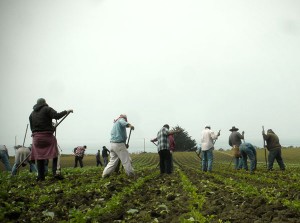
Unfortunately, nearly five decades after Chávez co-founded the United Farm Workers (UFW) union farm laborers are still some of America’s least-valued—though critically important—workers. Bon Appétit Management Company (BAMCO) Foundation and UFW released a report about conditions for farm workers in the United States on March 31st, César Chávez Day, entitled Inventory of Farmworker Issues and Protections in the United States.
The comprehensive report compiles data from federal and state governments and private sources detailing the working conditions and lack of laws and protections for the 1.4 million crop farm workers in the United States. BAMCO says it hopes that the report will make more American consumers aware that their food supply depends on socially and economically marginalized population, often working in appalling conditions. “Few people,” says the report, “are aware that farm workers are excluded from the basic labor and safety standards firmly established in other employment sectors… Most Americans would also be surprised to find that even the few rules that do exist for farm workers are rarely enforced.”
BAMCO is a nationwide restaurant company that runs over 400 cafés and catering services for corporations, universities, and specialty venues. The company emphasizes nutritious food made from local, seasonal ingredients. It supports environmentally sustainable food production and is committed to composting food waste and using compostable materials in its restaurants. After a 2009 visit to farms that supply tomatoes to their restaurants, CEO Fedele Bauccio and Vice President Maisie Greenawalt drafted a Code of Conduct for tomato growers. The code establishes fair working conditions, and BAMCO will not buy tomatoes from growers who refuse to sign it. Bauccio and Greenwalt believe that being true to their company’s motto, food services for a sustainable future, means supporting farm worker justice.
With support from Oxfam America, BAMCO and UFW compiled the 63-page report over the course of a year. Key findings from the report include:
- Farm workers are exempt from most federal wage and hour standards, and even existing regulations are rarely enforced, leading to rampant wage theft and other abuses;
- Children as young as 12 are legally allowed to engage in farm work, although it is one of the most dangerous employment sectors;
- Widespread use of subcontractors leads to lack of transparency and difficulty enforcing existing laws;
- Health and safety standards are inadequate, and even those that exist are rarely enforced;
- Most farm workers are ineligible for unemployment insurance and workers’ compensation insurance that is granted to employees in other sectors;
- And farm workers are explicitly excluded from laws that protect collective bargaining and free association.
By releasing the report, BAMCO and UFW hope to continue the legacy of César Chávez and encourage other companies and consumers to make socially responsible food choices. “More Americans than ever are interested in knowing where their food comes from,” says the report. “But even the most conscientious eaters and food industry professionals are usually in the dark about who picked it.”
Matt Styslinger is a research intern with the Nourishing the Planet project.

Danielle Nierenberg, an expert on livestock and sustainability, currently serves as Project Director of State of World 2011 for the Worldwatch Institute, a Washington, DC-based environmental think tank. Her knowledge of factory farming and its global spread and sustainable agriculture has been cited widely in the New York Times Magazine, the International Herald Tribune, the Washington Post, and
other publications.
Danielle worked for two years as a Peace Corps volunteer in the Dominican Republic. She is currently traveling across Africa looking at innovations that are working to alleviate hunger and poverty and blogging everyday at Worldwatch Institute’s Nourishing the Planet. She has a regular column with the Mail & Guardian, the Kansas City Star, and the Huffington Post and her writing was been featured in newspapers across Africa including the Cape Town Argus, the Zambia Daily Mail, Coast Week (Kenya), and other African publications. She holds an M.S. in agriculture, food, and environment from Tufts University and a B.A. in environmental policy from Monmouth College.








